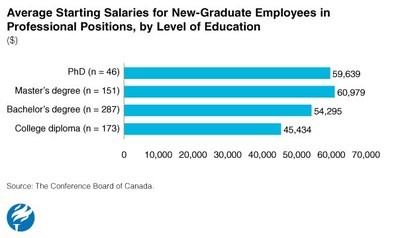Are Companies Willing to Pay More for Millennials with Specialized Skill Sets?
As a fresh crop of students complete their studies this spring, a new report by The Conference Board of Canada indicates that recent graduates with a bachelor’s degree can expect to earn an average annual starting salary in the range of $45,000 to $69,000. These numbers are slightly lower for those graduates with a college degree, and are higher for those with graduate degrees.

“Many young Canadians are experiencing difficulties integrating into the workforce or are underemployed in the current job market,” said Allison Cowan, Director, Compensation Research Centre, The Conference Board of Canada. “Despite these difficulties, many organizations are actively seeking highly educated millennials and are increasingly willing to pay a premium for new graduates to mine their specialized skill sets in areas such as technology and engineering.”
Highlights
- The highest average starting salaries can be found in roles requiring specialized training: geology (mean of $69,736) followed by engineering positions (mean of $65,183).
- The newest generation of Canadian youth—Generation Z—are beginning to enter the workforce. These young Canadians are recognizing the need for hands-on experience before finding full-time employment, and over a quarter of organizations bridge their co-op students, interns, and summer students into full-time positions.
- New graduates value personal and professional development opportunities. Advancement opportunities are reported as the top reason new graduates leave the organization.
- Hourly pay rates for co-op students, interns, and summer students range predictably by level of education—co-op students in high school receive an average hourly rate of $16.41; whereas those enrolled in a Master’s program make an average of $23.33 per hour.
The unemployment rate remains highest among young Canadians and about one in five of them are underemployed or working part-time involuntarily. However, with rates of retirement expected to reach almost one-tenth of the workforce over the next five years, employers will be looking to the younger generations to fill entry-level positions.
The report, New to the Workforce: Compensating and Developing Recent-Graduate and Student Employees, outlines the salaries and hourly wages earned by both new-graduate and student-level employees based on a national survey of Canadian employers. Starting salaries tend to be highest overall in specialized positions such as geology ($69,736) and engineering ($65,183). The highest starting salaries for new graduate employees in corporate positions can be found in the legal function and the lowest average starting salaries are in administrative support roles.
Both employers and students have expressed concern with the school-to-work transition and many organizations are working alongside educational institutions for solutions to better integrate entry-level employees into the workforce. It is common for organizations to offer co-op, internship, and summer work opportunities, while others are offering rotational programs for new entrants into the workforce. Almost a quarter of responding organizations indicated they have some form of rotational program for entry-level hires, where they provide the opportunity to cycle through different departments and roles. These programs often lead to permanent employment for new graduates, as more than 40 per cent of organizations reported hiring employees from these programs on a permanent basis upon completion of the program.
This research was conducted by The Conference of Canada’s Compensation Research Centre (CRC).
(Source: Conference Board of Canada)



